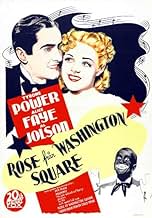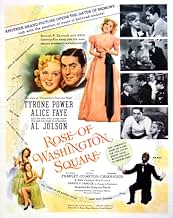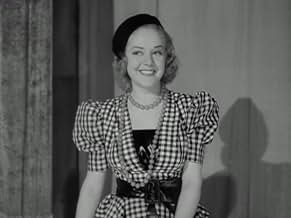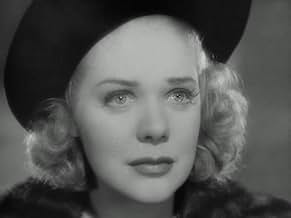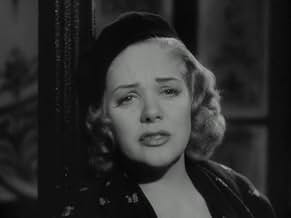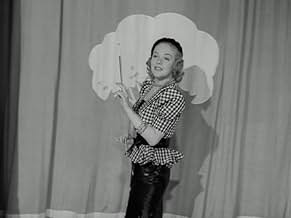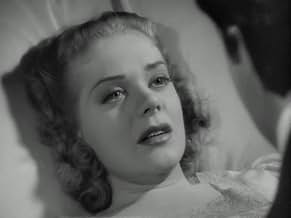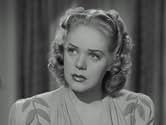NOTE IMDb
6,7/10
684
MA NOTE
Ajouter une intrigue dans votre langueA singer becomes a star in the Ziegfeld Follies, but her marriage to a con man has a bad effect on her career.A singer becomes a star in the Ziegfeld Follies, but her marriage to a con man has a bad effect on her career.A singer becomes a star in the Ziegfeld Follies, but her marriage to a con man has a bad effect on her career.
- Réalisation
- Scénario
- Casting principal
- Récompenses
- 2 victoires au total
Paul E. Burns
- Chump
- (as Paul Burns)
Horace McMahon
- Irving
- (as Horace MacMahon)
Avis à la une
This is an excellent movie musical from the 20th Fox studio, which made excellent movie musicals. Fox made all those great musicals with John Payne and Alice Faye, until she got supplanted by Betty Grable. It's all here - storyline, music, production values and a Who's-Who cast of memorable character actors from the Golden Age of Hollywood.
"Rose" is actually a revue with only one or two songs written for the movie; "I Never Knew Heaven Could Speak" is one and is the best song in the picture. The rest are songs from pre and post WW1 and are old standards - there are 20 songs in all. Then there is the Cigarette Dance which contains some trick photography and is very clever indeed.
It stars Tyrone Power and Alice Faye who handle acting chores, but the singing duties belong to Al Jolson, who at one time was considered the best entertainer of the 20th century on either coast. He comes alive when he sings his signature numbers but has a very limited acting range. This picture is seldom seen today because, for reasons rooted in the early part of the last century, Jolson sang in blackface. Apparently this worked for him but the film is no longer in the good graces of the PC crowd and those intimidated by them. The plot is based (loosely) on Fanny Brice and her husband/problem child Nicky Arnstein. As we know too well, Hollywood feels fiction is stranger than truth and punches up many stories that were good to begin with. Plus, they were true, and what fun is that.
Do yourself a favor; if you can find this picture watch it and see how Hollywood used to do it in the good old days. As I stated in the summary, that's entertainment in the purest sense of the term. I gave it a well-deserved rating of 8.
"Rose" is actually a revue with only one or two songs written for the movie; "I Never Knew Heaven Could Speak" is one and is the best song in the picture. The rest are songs from pre and post WW1 and are old standards - there are 20 songs in all. Then there is the Cigarette Dance which contains some trick photography and is very clever indeed.
It stars Tyrone Power and Alice Faye who handle acting chores, but the singing duties belong to Al Jolson, who at one time was considered the best entertainer of the 20th century on either coast. He comes alive when he sings his signature numbers but has a very limited acting range. This picture is seldom seen today because, for reasons rooted in the early part of the last century, Jolson sang in blackface. Apparently this worked for him but the film is no longer in the good graces of the PC crowd and those intimidated by them. The plot is based (loosely) on Fanny Brice and her husband/problem child Nicky Arnstein. As we know too well, Hollywood feels fiction is stranger than truth and punches up many stories that were good to begin with. Plus, they were true, and what fun is that.
Do yourself a favor; if you can find this picture watch it and see how Hollywood used to do it in the good old days. As I stated in the summary, that's entertainment in the purest sense of the term. I gave it a well-deserved rating of 8.
Very entertaining- a thinly disguised bio-pic of Fanny Brice. Power and Faye- at their acting peaks- are great as the leads. Faye is in great voice. However, Jolson steals the movie. At the age of 54, he was in the best voice of his career. His Rock- a Bye and California Here I Come are thrilling. I own the video, which also contains clips of several Jolson and Faye songs which were edited out of the final movie. a must for fans of the three stars.
The history of the cinema is filled with great movies; but more than that, there are special `moments,' from the great and even the not-so-great films that thanks to the magic of the movies have been preserved for all time, and now thanks to video and DVD are readily accessible for the viewing pleasure of audiences in living rooms everywhere. These movies are treasures to be cherished and savored, because they're not simply entertainment, but time capsules in which history has in some cases been inadvertently gathered and stored for posterity. And one of the jewels in this vast treasure chest that is the cinema is `Rose of Washington Square,' a 1939 picture from 20th Century Fox, filmed in glorious B&W, directed by Gregory Ratoff and starring Tyrone Power, Alice Faye and Al Jolson.
Power is Bart Clinton, a charismatic petty thief and con man whose charm and good looks keeps him one step ahead of the law as he moves from one scam to another. He's not such a bad guy, but more like a salesman without a product who utilizes his natural abilities to put a buck in his pocket. Faye is Rose Sargent, a struggling vaudeville singer, teamed up with Ted Cotter (Jolson), who together have hopes and dreams of making it to the big time. But worlds collide when Bart and Rose meet and fall in love. Ted sees Bart for what he is, but his advice to Rose falls on deaf ears, blinded as she is by her unconditional love for a man who stands in the way of not only her success as an artist, but her happiness, as well. And in the grandest tradition of Hollywood, their story plays out amid the excitement of that most famous of all avenues of aspirations, Broadway, and that town of towns, New York.
It's a good story, but with a plot that's far from unique, which in the grand scheme of things doesn't make any difference. This is solid and involving entertainment that affords the viewer the opportunity of seeing three bona fide stars together, and all doing what they do best. And just seeing them together on the screen is a moment all it's own; Power, Faye and Jolson, captured forever and immortalized through the magic of the motion picture. And at the time, who knew? To Darryl F. Zanuck this was no doubt just another picture that hopefully would produce a profitable bottom line for the studio. Did any of them have any idea what this would mean to audiences sixty years later, or what kind of legacy they were creating for future generations?
One of the best looking actors ever to grace the silver screen, Tyrone Power had a dominating presence and commanded attention in any role he played, from light, romantic fare like `Thin Ice,' to bringing the anti-hero, `Jesse James,' to life or the swashbuckling title character in `The Mark of Zorro.' He could play a heel like Bart Clinton and make him believable, or a guy soul searching for something better, as he did in `The Razor's Edge.' And if there's any doubt as to how good an actor Power was, one only has to look as far as his performance in `Nightmare Alley' to realize that he was so much more than just another pretty face. He was the man women wanted and the one other men envied because he seemed to have it all. He did; and it showed in every character he ever created for the screen.
Power, however, did not corner the market on talent and charisma in this film, but was matched every step of the way by his absolutely beguiling co-star, Alice Faye. Beautiful and gifted, Faye could sing and interpret a song in a way that was nothing less than transporting. Her vocal expressions and the emotion that dances in her eyes and plays across her face while she sings created a number of those special moments in a number of films. In this one, when she sings the heart-felt `My Man' while an incognito Power (Bart's on the lam at this point) sits huddled in the audience at the back of the auditorium, it'll grab you by the throat and send chills down your spine. And that is truly one of those memorable `Moments' that have made movies such an everlasting part of our lives and culture. When Faye turns those eyes of hers, fraught with emotion, to the camera as she sings, it's mesmerizing-- a moment that will hold you transfixed and sweep you away to another time and another place.
Which is exactly what happens when Al Jolson takes the spotlight as Ted Cotter. Jolson was perhaps the entertainer of his time, a man who entertained millions from the footlights of the most famous stages around the world. And what a treasure it is to have even part of his act preserved here on film. Some of the songs he made famous, like `Rock-a-bye-Your-Baby With A Dixie Melody,' and the one that became his trademark, `Mammy,' are seamlessly integrated into this story. Although this kind of entertainment may not be readily embraced by younger viewers-- those raised on hard rock and grunge, for example-- there is a magic in Jolson and his songs that defines an era, and with his unique voice and magnetic personality, it is riveting to watch him now in this film.
The supporting cast includes William Frawley (Harry), Joyce Compton (Peggy), Hobart Cavanaugh (Whitey), Louis Prima (Bandleader), Horace McMahon (Irving) and Moroni Olsen (Buck). It may not be the greatest musical-- or movie-- ever made, but nevertheless, `Rose of Washington Square' is a treasure, for all the reasons discussed here and more. It's a film that will be enjoyed and appreciated on any number of different levels by anyone who watches it; pure entertainment, with a particular magic all it's own. This one's a keeper. It's the magic of the movies. I rate this one 9/10.
Power is Bart Clinton, a charismatic petty thief and con man whose charm and good looks keeps him one step ahead of the law as he moves from one scam to another. He's not such a bad guy, but more like a salesman without a product who utilizes his natural abilities to put a buck in his pocket. Faye is Rose Sargent, a struggling vaudeville singer, teamed up with Ted Cotter (Jolson), who together have hopes and dreams of making it to the big time. But worlds collide when Bart and Rose meet and fall in love. Ted sees Bart for what he is, but his advice to Rose falls on deaf ears, blinded as she is by her unconditional love for a man who stands in the way of not only her success as an artist, but her happiness, as well. And in the grandest tradition of Hollywood, their story plays out amid the excitement of that most famous of all avenues of aspirations, Broadway, and that town of towns, New York.
It's a good story, but with a plot that's far from unique, which in the grand scheme of things doesn't make any difference. This is solid and involving entertainment that affords the viewer the opportunity of seeing three bona fide stars together, and all doing what they do best. And just seeing them together on the screen is a moment all it's own; Power, Faye and Jolson, captured forever and immortalized through the magic of the motion picture. And at the time, who knew? To Darryl F. Zanuck this was no doubt just another picture that hopefully would produce a profitable bottom line for the studio. Did any of them have any idea what this would mean to audiences sixty years later, or what kind of legacy they were creating for future generations?
One of the best looking actors ever to grace the silver screen, Tyrone Power had a dominating presence and commanded attention in any role he played, from light, romantic fare like `Thin Ice,' to bringing the anti-hero, `Jesse James,' to life or the swashbuckling title character in `The Mark of Zorro.' He could play a heel like Bart Clinton and make him believable, or a guy soul searching for something better, as he did in `The Razor's Edge.' And if there's any doubt as to how good an actor Power was, one only has to look as far as his performance in `Nightmare Alley' to realize that he was so much more than just another pretty face. He was the man women wanted and the one other men envied because he seemed to have it all. He did; and it showed in every character he ever created for the screen.
Power, however, did not corner the market on talent and charisma in this film, but was matched every step of the way by his absolutely beguiling co-star, Alice Faye. Beautiful and gifted, Faye could sing and interpret a song in a way that was nothing less than transporting. Her vocal expressions and the emotion that dances in her eyes and plays across her face while she sings created a number of those special moments in a number of films. In this one, when she sings the heart-felt `My Man' while an incognito Power (Bart's on the lam at this point) sits huddled in the audience at the back of the auditorium, it'll grab you by the throat and send chills down your spine. And that is truly one of those memorable `Moments' that have made movies such an everlasting part of our lives and culture. When Faye turns those eyes of hers, fraught with emotion, to the camera as she sings, it's mesmerizing-- a moment that will hold you transfixed and sweep you away to another time and another place.
Which is exactly what happens when Al Jolson takes the spotlight as Ted Cotter. Jolson was perhaps the entertainer of his time, a man who entertained millions from the footlights of the most famous stages around the world. And what a treasure it is to have even part of his act preserved here on film. Some of the songs he made famous, like `Rock-a-bye-Your-Baby With A Dixie Melody,' and the one that became his trademark, `Mammy,' are seamlessly integrated into this story. Although this kind of entertainment may not be readily embraced by younger viewers-- those raised on hard rock and grunge, for example-- there is a magic in Jolson and his songs that defines an era, and with his unique voice and magnetic personality, it is riveting to watch him now in this film.
The supporting cast includes William Frawley (Harry), Joyce Compton (Peggy), Hobart Cavanaugh (Whitey), Louis Prima (Bandleader), Horace McMahon (Irving) and Moroni Olsen (Buck). It may not be the greatest musical-- or movie-- ever made, but nevertheless, `Rose of Washington Square' is a treasure, for all the reasons discussed here and more. It's a film that will be enjoyed and appreciated on any number of different levels by anyone who watches it; pure entertainment, with a particular magic all it's own. This one's a keeper. It's the magic of the movies. I rate this one 9/10.
ROSE OF WASHINGTON SQUARE (20th Century-Fox, 1939), directed by Gregory Ratoff, a nostalgic musical, is a worthy follow-up to Fox's previous success, ALEXANDER'S RANGTIME BAND (1938), both starring the up-and-coming Tyrone Power and Alice Faye, making their third and final screen appearance together (their initial being IN OLD CHICAGO in 1937). While this production belongs to Alice Faye and Tyrone Power in that order, it's Al Jolson, assuming third billing in a secondary role, who comes off best. His fine acting and song delivery remain the film's major asset, which makes one wish he were given more to do. ROSE OF WASHINGTON SQUARE is also the most musical of all the Jolson, as well as Faye films.
In a story that opens circa 1919, Ted Cotter (Al Jolson) and Rose Sargent (Alice Faye) partners who specialize in singing, struggling to achieve success, are both working separately, he in a burlesque house singing while passing out theater programs, and she at amateur nights singing for nickels and dimes tossed to her. Disappointed, Rose breaks away from theater life to a Long Island resort accompanied by her friend, Peggy (Joyce Compton). While there she encounters Barton DeWitt Clinton (Tyrone Power), a handsome war veteran who happens to be a petty thief. A smooth operator, Clinton immediately wins Rose's affections. After his latest theft involving an expensive stolen necklace backfires, and under the watchful eye of Detective Mike (Charles C. Wilson), Clinton quickly leaves without any notice to Rose. In the meantime, Harry Long (William Frawley), a booking agent, has arranged for Ted to appear in a tryout. Thanks to the unintentional interruptions by the intoxicated loud-mouth patron (Hobart Cavanaugh) sitting up in the box, the act proves favorable and hired to boost up attendance. successful. As for Rose, she's singing in a basement speakeasies until she she once again encounters Clinton who saves her from a police raid. This time the two become inseparable and eventually marry, much to the dismay of Ted, who sees through Clinton for what he really is, but agrees to remain neutral for Rosie's sake. After Rose achieves her long delayed success in the Ziegfeld Follies, her personal life turns to heartache as Clinton, in desperate need of money, gets himself deeper and deeper in debt, leading to arrest and prison term.
With a handful of old-time Broadway songs from the 1920s era, Alice Faye sings them in her usual manner, although several of them, including "My Man," are reportedly long associated with the legendary Fanny Brice. As for Al Jolson, he reprises many of his most celebrated hits in his traditional black-face manner. He is one for the memory book of legendary bygone entertainers. The musical program includes: "Pretty Baby" (sung by Al Jolson); "I'm Sorry I Made You Cry" (sung by Alice Faye); "Ja-Da" and "Vamp" (both sung by Faye); "Rock-a-Bye Your Baby With A Dixie Melody" and "Toot-Toot Tootsie, Goodbye" (both sung by Jolson); "I'm Just Wild About Harry" (Alice Faye); "California, Here I Come" (Al Jolson); "I Never Knew Heaven Could Speak" and "Rose of Washington Square" (both sung by Faye); "Mammy" (Al Jolson); "My Man" and "My Man" (reprise, both sung by Faye). While the majority of the tunes are mainly sung by the principal players, with the camera giving them full focus, only the title tune is given the full production number treatment running nearly ten minutes.
Also seen in the cast are: Moroni Olson playing Buck Russell; E.E. Clive, Louis Prima, Ben Weldon, Harry Hayden, Charles Lane and John Hamilton.
According to an well documented, "HIDDEN Hollywood: FROM THE VAULTS OF 20th CENTURY-FOX" narrated by Joan Collins, which premiered on American Movie Classics in 1997, ROSE OF WASHINGTON SQUARE was originally planned as a two hour presentation, but was then cut to 86 minutes. Included in this documentary are numerous outtakes, featuring Jolson's rendition of "April Showers" and "Avalon," and Alice Faye's version to the film's theme song, "I'm Always Chasing Rainbows." Another added bonus was the guest appearances of the comedy team of Weber and Fields doing a stage act, as observed in the audience by Jolson and William Frawley. It's also been noted somewhere that actress Winifred Harris appeared as Broadway legend Lillian Russell (a role Alice Faye would portray in 1940), whose scenes were also cut. The documentary does explain as to why certain scenes didn't make it to the final print. As with other 20th Century-Fox musicals attempting to recapture the days of old Broadway, ROSE OF WASHINGTON SQUARE is historically inaccurate in the hairstyle and fashion department being 1939 modern. Although the opening titles credit this movie to be entirely fiction, there's no doubt that it's suggested on the career of Fanny Brice.
In spite of these shortcomings, ROSE OF WASHINGTON SQUARE, as a musical, is entertaining as well as involving in plot. As mentioned before, Al Jolson nearly steals the limelight from his leading players. Sadly, this would mark an end of a era for this legendary singer whose legacy remains with THE JAZZ SINGER (Warner Brothers, 1927),Hollywood's "first talkie," while Power and Faye would continue their fame and fortune for the duration of their careers.
ROSE OF WASHINGTON SQUARE, distributed to home video in the 1990s, unseen on cable TV since it's American Movie Classic days, made its Turner Classic Movies premiere May 5, 2013. The home video edition contains "April Showers" and "Avalon" outtakes, along with its theatrical trailer. Of her musicals, ROSE OF WASHINGTON SQUARE has become one of the most remembered and admired of all her movies. (***)
In a story that opens circa 1919, Ted Cotter (Al Jolson) and Rose Sargent (Alice Faye) partners who specialize in singing, struggling to achieve success, are both working separately, he in a burlesque house singing while passing out theater programs, and she at amateur nights singing for nickels and dimes tossed to her. Disappointed, Rose breaks away from theater life to a Long Island resort accompanied by her friend, Peggy (Joyce Compton). While there she encounters Barton DeWitt Clinton (Tyrone Power), a handsome war veteran who happens to be a petty thief. A smooth operator, Clinton immediately wins Rose's affections. After his latest theft involving an expensive stolen necklace backfires, and under the watchful eye of Detective Mike (Charles C. Wilson), Clinton quickly leaves without any notice to Rose. In the meantime, Harry Long (William Frawley), a booking agent, has arranged for Ted to appear in a tryout. Thanks to the unintentional interruptions by the intoxicated loud-mouth patron (Hobart Cavanaugh) sitting up in the box, the act proves favorable and hired to boost up attendance. successful. As for Rose, she's singing in a basement speakeasies until she she once again encounters Clinton who saves her from a police raid. This time the two become inseparable and eventually marry, much to the dismay of Ted, who sees through Clinton for what he really is, but agrees to remain neutral for Rosie's sake. After Rose achieves her long delayed success in the Ziegfeld Follies, her personal life turns to heartache as Clinton, in desperate need of money, gets himself deeper and deeper in debt, leading to arrest and prison term.
With a handful of old-time Broadway songs from the 1920s era, Alice Faye sings them in her usual manner, although several of them, including "My Man," are reportedly long associated with the legendary Fanny Brice. As for Al Jolson, he reprises many of his most celebrated hits in his traditional black-face manner. He is one for the memory book of legendary bygone entertainers. The musical program includes: "Pretty Baby" (sung by Al Jolson); "I'm Sorry I Made You Cry" (sung by Alice Faye); "Ja-Da" and "Vamp" (both sung by Faye); "Rock-a-Bye Your Baby With A Dixie Melody" and "Toot-Toot Tootsie, Goodbye" (both sung by Jolson); "I'm Just Wild About Harry" (Alice Faye); "California, Here I Come" (Al Jolson); "I Never Knew Heaven Could Speak" and "Rose of Washington Square" (both sung by Faye); "Mammy" (Al Jolson); "My Man" and "My Man" (reprise, both sung by Faye). While the majority of the tunes are mainly sung by the principal players, with the camera giving them full focus, only the title tune is given the full production number treatment running nearly ten minutes.
Also seen in the cast are: Moroni Olson playing Buck Russell; E.E. Clive, Louis Prima, Ben Weldon, Harry Hayden, Charles Lane and John Hamilton.
According to an well documented, "HIDDEN Hollywood: FROM THE VAULTS OF 20th CENTURY-FOX" narrated by Joan Collins, which premiered on American Movie Classics in 1997, ROSE OF WASHINGTON SQUARE was originally planned as a two hour presentation, but was then cut to 86 minutes. Included in this documentary are numerous outtakes, featuring Jolson's rendition of "April Showers" and "Avalon," and Alice Faye's version to the film's theme song, "I'm Always Chasing Rainbows." Another added bonus was the guest appearances of the comedy team of Weber and Fields doing a stage act, as observed in the audience by Jolson and William Frawley. It's also been noted somewhere that actress Winifred Harris appeared as Broadway legend Lillian Russell (a role Alice Faye would portray in 1940), whose scenes were also cut. The documentary does explain as to why certain scenes didn't make it to the final print. As with other 20th Century-Fox musicals attempting to recapture the days of old Broadway, ROSE OF WASHINGTON SQUARE is historically inaccurate in the hairstyle and fashion department being 1939 modern. Although the opening titles credit this movie to be entirely fiction, there's no doubt that it's suggested on the career of Fanny Brice.
In spite of these shortcomings, ROSE OF WASHINGTON SQUARE, as a musical, is entertaining as well as involving in plot. As mentioned before, Al Jolson nearly steals the limelight from his leading players. Sadly, this would mark an end of a era for this legendary singer whose legacy remains with THE JAZZ SINGER (Warner Brothers, 1927),Hollywood's "first talkie," while Power and Faye would continue their fame and fortune for the duration of their careers.
ROSE OF WASHINGTON SQUARE, distributed to home video in the 1990s, unseen on cable TV since it's American Movie Classic days, made its Turner Classic Movies premiere May 5, 2013. The home video edition contains "April Showers" and "Avalon" outtakes, along with its theatrical trailer. Of her musicals, ROSE OF WASHINGTON SQUARE has become one of the most remembered and admired of all her movies. (***)
Entertainment careers, romance, and petty crime mix together to create a reasonably good film, based on the real life story of Ziegfeld star Fanny Brice and her attraction to gambler Nicky Arnstein. The script changes the names, and the two leads become Rose (Alice Faye) and Bart (Tyrone Power). "Rose Of Washington Square" is a thin story connected by numerous musical numbers.
The film has the look and feel of a long-ago era, specifically Vaudeville, with its eclectic mix of self-contained acts: singing, dancing, magic, and comedy. One lengthy segment features Rose singing in Washington Square, but interrupted by an unrelated act called "Igor and Tanya", an acrobatic performance not connected to anything else in the film. And then there's the stage performance wherein Rose and various dancers perform a dance that includes a magic act. As the dancing proceeds, each person brings forth a lit cigarette out of thin air, smokes it, then fetches another cigarette from out of nowhere.
This tribute to Vaudeville goes into overdrive with the appearance of entertainer Al Jolson, as character Ted Cotter. This character has little or nothing to do with Fanny Brice. I think the reason he's in the script is that he represents Brice's historical era. Jolson's inclusion ignites the plot, generating real pizazz into an otherwise lazy, dreary story. All bug-eyed and in black-face, and wearing white gloves, Jolson electrifies at the plush Winter Garden Theater, with his standard songs: "Rock-A-Bye Your Baby", "My Mammy", and "California, Here I Come".
Casting is mixed. Tyrone Power is surprisingly good. And I enjoyed William Frawley as a talent agent. But glamorous Alice Faye is not convincing as a stand-in for Brice. Faye does sing quite well, but I didn't care for any of her songs, with the exception of "My Man", Brice's signature number.
Costumes, hairdos, and prod design all seem to reflect well the early twentieth century era. B&W cinematography, sound effects, and editing are all competent, and pleasantly unobtrusive.
Without Jolson, the film would be average at best. But Jolson alone ups the entertainment value several notches, and that Vaudeville atmosphere is wonderfully nostalgic.
The film has the look and feel of a long-ago era, specifically Vaudeville, with its eclectic mix of self-contained acts: singing, dancing, magic, and comedy. One lengthy segment features Rose singing in Washington Square, but interrupted by an unrelated act called "Igor and Tanya", an acrobatic performance not connected to anything else in the film. And then there's the stage performance wherein Rose and various dancers perform a dance that includes a magic act. As the dancing proceeds, each person brings forth a lit cigarette out of thin air, smokes it, then fetches another cigarette from out of nowhere.
This tribute to Vaudeville goes into overdrive with the appearance of entertainer Al Jolson, as character Ted Cotter. This character has little or nothing to do with Fanny Brice. I think the reason he's in the script is that he represents Brice's historical era. Jolson's inclusion ignites the plot, generating real pizazz into an otherwise lazy, dreary story. All bug-eyed and in black-face, and wearing white gloves, Jolson electrifies at the plush Winter Garden Theater, with his standard songs: "Rock-A-Bye Your Baby", "My Mammy", and "California, Here I Come".
Casting is mixed. Tyrone Power is surprisingly good. And I enjoyed William Frawley as a talent agent. But glamorous Alice Faye is not convincing as a stand-in for Brice. Faye does sing quite well, but I didn't care for any of her songs, with the exception of "My Man", Brice's signature number.
Costumes, hairdos, and prod design all seem to reflect well the early twentieth century era. B&W cinematography, sound effects, and editing are all competent, and pleasantly unobtrusive.
Without Jolson, the film would be average at best. But Jolson alone ups the entertainment value several notches, and that Vaudeville atmosphere is wonderfully nostalgic.
Le saviez-vous
- AnecdotesThis film closely resembles the life of entertainer Fanny Brice, and Alice Faye even sings Brice's signature song, "My Man" in the film. According to Alice Faye: The Star Next Door (1996), Brice and her second husband, Nicky Arnstein, sued 20th Century Fox for $750,000. The studio benefited from the publicity generated by the lawsuit - the film became the highest grossing musical of 1939 - and eventually settled out of court with both: Arnstein accepted $25,000, while Brice demanded considerably more and agreed to an undisclosed amount.
- Citations
Barton Dewitt Clinton: You know, I wish you were in some kind of trouble.
Rose Sargent: But why?
Barton Dewitt Clinton: Just so that I could get you out of it.
- Versions alternativesThey cut out Alice Faye singing "Chasing Rainbows" from the film, but it is on the DVD.
- ConnexionsFeatured in Take It or Leave It (1944)
Meilleurs choix
Connectez-vous pour évaluer et suivre la liste de favoris afin de recevoir des recommandations personnalisées
Détails
- Date de sortie
- Pays d’origine
- Langue
- Aussi connu sous le nom de
- Rose of Washington Square
- Lieux de tournage
- Société de production
- Voir plus de crédits d'entreprise sur IMDbPro
- Durée
- 1h 26min(86 min)
- Couleur
- Rapport de forme
- 1.37 : 1
Contribuer à cette page
Suggérer une modification ou ajouter du contenu manquant

